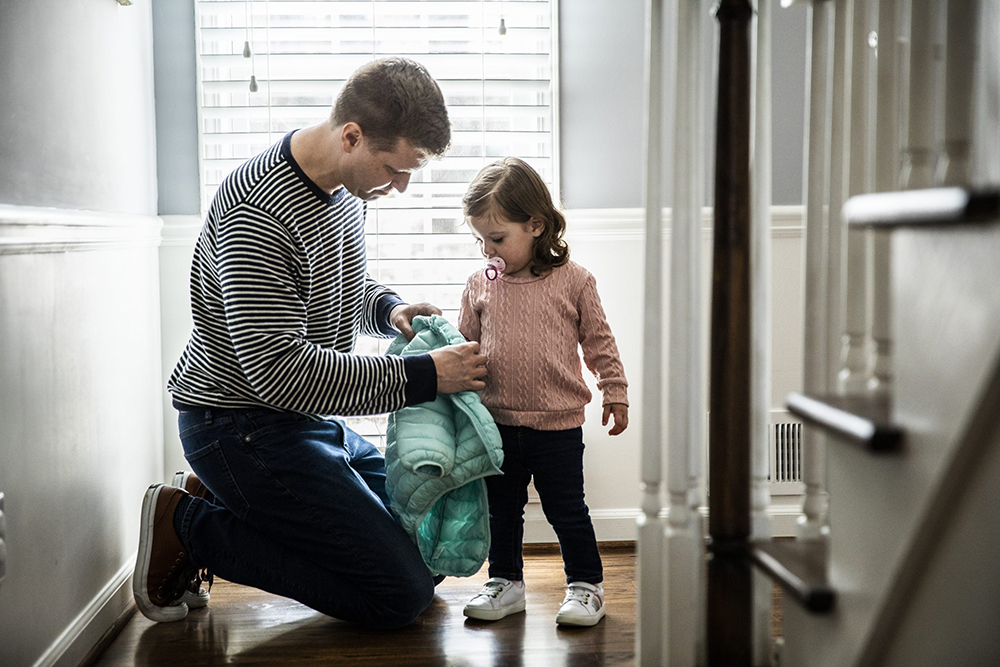
不久之前,在影视作品中经常看到爸爸们作为笨手笨脚的次要看护人,不知道如何给孩子扎头发或换尿布。但一项最新研究显示,“无用的爸爸”这种刻板印象与现实相去甚远。
事实上,皮尤研究中心(Pew Research Center)的最新分析发现,目前爸爸们在全职家长中的占比达到18%。
过去30年,全职爸爸的数量增长了近一倍,经济下滑促进了这种趋势。
在千禧年之交,全职爸爸在所有爸爸中所占的比例只有5%。
2008年左右,这一比例提高到9%。但随着经济复苏,担任主要看护人角色的爸爸数量逐步减少,直到后来疫情爆发。
在英国,研究显示,在疫情期间,全职爸爸的数量增加了三分之一,这凸显出一种全球文化转变。许多男性不得不在远程办公的同时,兼顾照顾子女的责任,这是史上第一次出现这种现象。
爸爸们为什么居家
全职家长依旧以女性为主,皮尤研究中心调查发现,约80%的女性居家的唯一目的是照顾家人,但全职爸爸不太可能因为同样的原因离开劳动力队伍。
超过三分之一的爸爸们居家的原因是因病或残疾无法工作,有13%已经退休,有13%表示他们找不到工作,还有8%将回到校园。
此外,有23%的男性表示居家的目的是为了处理家务或照顾家人。
但与30年前相比,这依旧是一个巨大的转变。30年前,56%的爸爸们因为疾病或残疾居家,只有4%是为了照顾子女。
数据显示,越来越多爸爸们优先选择照顾子女而不是挣钱养家,他们并非在受伤或者在经济衰退期间失业后才不得不承担起这份责任。
这份全职爸爸分析报告的作者、皮尤高级研究员理查德·福莱对Insider表示:“全国的爸爸们当中出现了一种转变。这能否称得上巨大转变?不能。但有一些证据似乎可以证明,性别规范的变化使全职爸爸数量增加。”
此外,全职爸爸与职场爸爸相比,受教育程度和经济地位更低。但过去三十年,有学士学位的全职爸爸的比例不断提高。
福莱表示:“如果你受过更好的教育,你成为全职爸爸的可能性较低。”
由于儿童护理成本通常令无数家庭难以承受,因此收入较低的家长居家照顾子女在经济上是可行的。随着越来越多女性接受高等教育并进入职场,爸爸们更有可能成为收入更低的一方,他们可能会离开职场,承担起照顾子女的责任。(财富中文网)
翻译:刘进龙
审校:汪皓
不久之前,在影视作品中经常看到爸爸们作为笨手笨脚的次要看护人,不知道如何给孩子扎头发或换尿布。但一项最新研究显示,“无用的爸爸”这种刻板印象与现实相去甚远。
事实上,皮尤研究中心(Pew Research Center)的最新分析发现,目前爸爸们在全职家长中的占比达到18%。
过去30年,全职爸爸的数量增长了近一倍,经济下滑促进了这种趋势。
在千禧年之交,全职爸爸在所有爸爸中所占的比例只有5%。
2008年左右,这一比例提高到9%。但随着经济复苏,担任主要看护人角色的爸爸数量逐步减少,直到后来疫情爆发。
在英国,研究显示,在疫情期间,全职爸爸的数量增加了三分之一,这凸显出一种全球文化转变。许多男性不得不在远程办公的同时,兼顾照顾子女的责任,这是史上第一次出现这种现象。
爸爸们为什么居家
全职家长依旧以女性为主,皮尤研究中心调查发现,约80%的女性居家的唯一目的是照顾家人,但全职爸爸不太可能因为同样的原因离开劳动力队伍。
超过三分之一的爸爸们居家的原因是因病或残疾无法工作,有13%已经退休,有13%表示他们找不到工作,还有8%将回到校园。
此外,有23%的男性表示居家的目的是为了处理家务或照顾家人。
但与30年前相比,这依旧是一个巨大的转变。30年前,56%的爸爸们因为疾病或残疾居家,只有4%是为了照顾子女。
数据显示,越来越多爸爸们优先选择照顾子女而不是挣钱养家,他们并非在受伤或者在经济衰退期间失业后才不得不承担起这份责任。
这份全职爸爸分析报告的作者、皮尤高级研究员理查德·福莱对Insider表示:“全国的爸爸们当中出现了一种转变。这能否称得上巨大转变?不能。但有一些证据似乎可以证明,性别规范的变化使全职爸爸数量增加。”
此外,全职爸爸与职场爸爸相比,受教育程度和经济地位更低。但过去三十年,有学士学位的全职爸爸的比例不断提高。
福莱表示:“如果你受过更好的教育,你成为全职爸爸的可能性较低。”
由于儿童护理成本通常令无数家庭难以承受,因此收入较低的家长居家照顾子女在经济上是可行的。随着越来越多女性接受高等教育并进入职场,爸爸们更有可能成为收入更低的一方,他们可能会离开职场,承担起照顾子女的责任。(财富中文网)
翻译:刘进龙
审校:汪皓
Not too long ago, dads onscreen took on the starring role as the fumbling secondary caregiver who didn’t know how to braid their child’s hair or change a nappy, but according to new research, the “useless dads” stereotype is very wide off the mark.
In fact, dads now make up 18% of stay-at-home parents, according to a new Pew Research Center analysis.
The number of stay-at-home fathers has nearly doubled over the past 30 years, with economic downturns fuelling the trend.
Just 5% of fathers were stay-at-home dads at the turn of the millennium.
Around 2008, this percentage surged to 9%, yet with a strengthening economy, the share of fathers in the primary caregiver role gradually diminished—until the pandemic hit.
In the U.K. as well, research indicates that stay-at-home dads surged by a third during the pandemic, highlighting a global cultural shift as many men were compelled, for the first time, to juggle childcare duties while working remotely.
Why dads are staying at home
While mothers still make up the lion’s share of stay-at-home parents, with Pew Research Center finding almost 80% of women are staying at home for the sole purpose of taking care of their household, stay-at-home dads are less likely to be dropping out of the workforce for the same reason.
Over one-third are not working due to illness or disability, some 13% are retired, 13% said they could not find work, and 8% are going to school.
Meanwhile, 23% cited staying at home to care for the home or family.
Still, this represents a big shift from 30 years ago when 56% of fathers were staying at home due to an illness or disability and merely 4% were doing so to look after their kids.
The data suggests that dads are increasingly choosing parenting over breadwinning, instead of taking on the role by default after being injured or let go from their job during a recession.
“There is a bit of a shift among the nation’s fathers,” Richard Fry, a senior researcher at Pew who authored the analysis on stay-at-home dads, told Insider. “Is it huge? No. But there seems to be some evidence that changing gender norms are contributing to the rise in stay-at-home dads.”
Moreover, stay-at-home fathers generally have lower education and economic status compared to their employed counterparts. However, the proportion of stay-at-home dads with a bachelor’s degree has increased over the past three decades.
“If you’re a better-educated dad, you’re less likely to be a stay-at-home father,” Fry said.
With childcare expenses often out of reach for numerous families, it becomes economically viable for the lower-earning parent to stay home. As more women pursue higher education and enter the workforce, it’s becoming more probable for fathers to step in as the lower-earning parent who might leave work for child-rearing.






